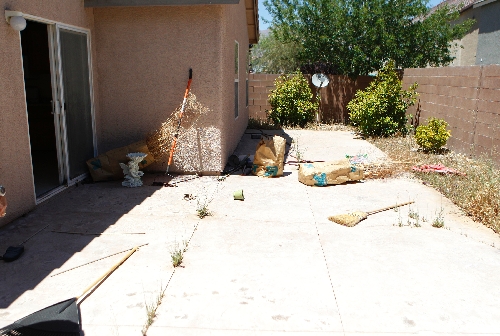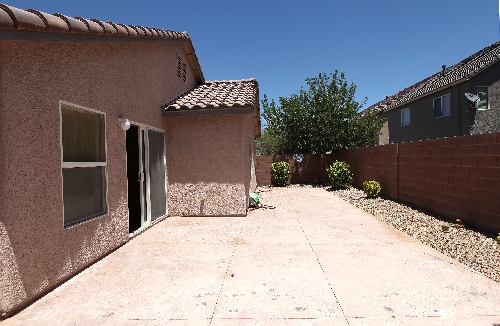Damaged foreclosures hurting Las Vegas values




Zolt Szorenyi makes a list of repairs needed on a foreclosure home he purchased in May in North Las Vegas, starting with fixing the lock on the sliding back door to keep out vagrants.
The grass is dead, weeds are knee-high and trash is strewn about the property. There’s a rake, a hoe and a bag of garden soil sitting on the patio. Somebody had good intentions, at least.
Carpets will need to be replaced in all four bedrooms, and walls will be painted in two-tone earth colors. Tile is going down in two bathrooms and the laundry room.
Including landscaping, Szorenyi estimates he’ll have to put $6,500 into the 1,600-square-foot, single-story home he bought at auction for $91,000. He figures he can sell it for $115,000 to $118,000.
One home at a time. That’s how we put the brakes on declining home values in Las Vegas, said Szorenyi, chief executive officer of Lenders Clearing House.
"It is not a matter of supply and demand," Szorenyi said. "There are plenty of offers and interested buyers. The reason Las Vegas home values keep dropping is directly tied to foreclosed properties that are being neglected by banks and left in bad condition for long periods."
HOMES LANGUISH ON MARKET
Deterioration of vacant homes — many of them bank-owned — continues to drag down home values in Las Vegas while other housing markets are showing signs of stabilization.
Local home values have dropped more than 60 percent from their peak to a median price of $111,000 in May, Home Builders Research reports.
Bank of America spokeswoman Jumana Bauwens said the bank has policies to secure and maintain properties that become vacant before foreclosure and to keep properties up to neighborhood standards after foreclosure.
"When we learn that a property is not being maintained, we will take immediate action to remedy the situation," Bauwens said.
Yet hundreds of foreclosed homes languish on the market for months, even years, often hurting home values in the surrounding neighborhood, Szorenyi said. They’re consistently devalued by appraisers, chopped by $5,000 or more based simply on appearance.
"Why do values drop on a daily basis? It’s all perception," he said. "If an appraiser comes out and sees this, he’s going to deduct for this. The continuous value reduction is due to appraisers. It’s not going to end. Banks will go lower and lower on prices."
Szorenyi passed on purchasing a home on which roof trusses had been cut out to remove the air conditioner. Other homes have been stripped of copper wiring, plumbing fixtures and appliances.
On May 29, Gov. Brian Sandoval signed Assembly Bill 373, which makes it a misdemeanor for any homeowner or renter who removes, conceals or destroys any real property that is subject to foreclosure with the intent to defraud and who causes a secured party to suffer pecuniary loss.
"I’ve never seen anyone go to jail for it," Szorenyi said. "At the end of the day, it’s very difficult to catch anyone red-handed. If you get to the house and it’s empty, how do you prove it’s the previous owner and not the neighbor?"
The banks’ "cash for keys" offer, typically $2,000 to $3,000 for the home- owner to leave the property in good condition, is open to scams, Szorenyi said. People move back into the house, even if they don’t own it, because the banks don’t recognize who’s real and who’s a crook, he said.
PLAYING ‘FORECLOSURE ROULETTE”
So here we’re stuck — the foreclosure capital of the nation — with a glut of vacant homes fueling the self-destruction of a once booming Las Vegas housing market. Local housing analysts estimate that three-fourths of the total real estate-owned inventory are empty homes.
They’re staying on the market longer. ForeclosureRadar reported a time frame of 323 days from notice of default to foreclosure sale in Clark County in June, compared with 236 days a year ago. Foreclosure filings have tailed off to 3,528 in June, the lowest level in 15 months.
Sean O’Toole, chief executive officer of Discovery Bay, Calif.-based ForeclosureRadar, said he was surprised to see Clark County foreclosure activity drop in April, May and June.
Banks are playing a game of "foreclosure roulette" by which they randomly foreclose on a few homeowners, while delaying other foreclosures, he said.
"The primary aim of the bank’s random foreclosures being that they can’t let word get out that you can stop making mortgage payments and live in your home for free for years on end, as is increasingly the case," O’Toole said. "Otherwise, millions of underwater, but paying, homeowners might also stop making payments, spelling disaster for the banks."
Bank of America has resumed foreclosing on loans originated by Countrywide after voluntarily imposing a foreclosure moratorium in October because of the robo-signing scandal, he said.
"We actually expected an increase in activity as lenders began to catch up after these delays," O’Toole said. "We remain as convinced as ever that these delays are simply part of the current game of foreclosure roulette. Hopefully someday soon lenders stop playing games and begin really dealing with the looming shadow of delinquent and underwater borrowers. Whether through loan modifications, short sales or even foreclosure, it’s time to move forward."
O’Toole said banks are working to "extend and pretend" by pushing home mortgage losses into the future. He hears conjecture that banks are taking longer to foreclose on higher-balance loans for which losses will be greater, and loans in which they have a conflict of interest because they service the first mortgage and hold the second mortgage in their portfolio.
Bank of America’s Bauwens said she sees no conflict of interest. The banks are protecting their interests, she said.
With trashed foreclosures, banks are left with a mess. Disgruntled homeowners stick it to the bank by destroying or stealing anything valuable. Whatever’s left behind is subject to vandalism and burglary.
Ann Hartman of Keller-Williams Realty said men with trucks went to a home in Sun City Anthem in the middle of June and hauled out the air conditioner, appliances, cabinets and fixtures. A neighbor asked what they were doing and was told, "None of your business," Hartman said.
The neighbor called Henderson police, who said there was nothing they could do about it.
"It’s obvious they were ripping the place off. I’ve heard of people who call thieves and tell them there’s this and that in the house and then sell them the key for $2,000. They go in overnight and strip the place," Hartman said.
Short of watching the property 24 hours, seven days a week, or installing expensive security systems with surveillance cameras, it’s hard to catch someone for vandalism or burglary, she said.
"I not only want to stop them, I want to bust them," Hartman added.
LACKING MONEY FOR REPAIRS
Szorenyi said he used to buy eight homes a week at trustee auctions, but lately he’s been sitting on the sidelines, buying one or two a week. Competition is intense and there’s always the danger of overbidding against zealous investors.
Szorenyi sends drivers around the valley inspecting properties he’s interested in purchasing.
"I have to be very careful these days with what I’m buying," he said. "If I get something with the copper (wiring) missing, or concrete poured down the drain, I could lose $25,000 to $30,000. You might as well throw your money on the roulette wheel."
Within 48 hours of buying a home, Szorenyi sends his work crews to get the house cleaned up, fixed up and looking almost like new. The home is professionally inspected and certified for move-in with a home warranty offered by Lenders Clearing House.
Szorenyi said he sells about 300 homes a year at or above market prices, usually within a week to 60 days on the market.
"The majority of buyers today are not cash-rich," the investor said. "When they close on a home with 3½ percent down and closing costs, they don’t have $15,000 to fix it up."
The city of Las Vegas issues fines for properties that violate ordinances for weeds and trash, and charges for cleanup costs. Combined with homeowner association fines, the potential owner could be looking at $10,000 to $40,000 in hidden costs to purchase a foreclosure, Szorenyi said.
"These HOAs don’t want to back out," he said. "This is one reason why banks don’t know how to do this. They don’t take care of the issue and every week they get fined $1,000 easy. We’re probably going to get stuck with a $2,000 fine from the city."
Joe Boteilho, Clark County’s chief of code enforcement, said officers respond to a variety of complaints about a particular property’s condition, usually from neighbors.
Fines for violations start at $100 a day for the first 10 days after notification, increasing to $500 a day for the next 20 days and $1,000 a day after 30 days.
"What we have here is the best mechanism on the books to give people due process and get them to rehabilitate properties," Boteilho said.
Szorenyi said he’s been able to get $35,000 in fines reduced to $1,000 after cleaning up a property.
It will take years before we see how the Las Vegas housing market pans out, but one thing Szorenyi knows for sure is that the banks hold the solution going forward.
"Banks are losing money by their unwillingness to fix up their homes and it is impacting the market overall," the investor said. "It’s not good for the banks, the buyers or the neighborhoods, and values are not going to stop dropping until the banks change their tactics."
Contact reporter Hubble Smith at hsmith@reviewjournal.com or 702-383-0491.


















